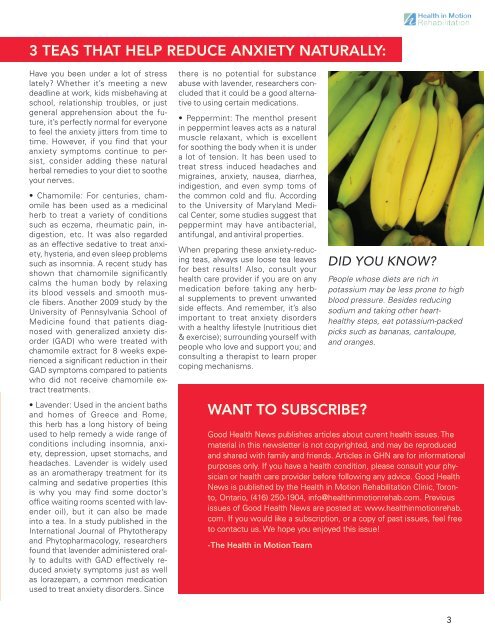GOOD HEALTH NEWS
Create successful ePaper yourself
Turn your PDF publications into a flip-book with our unique Google optimized e-Paper software.
3 TEAS THAT HELP REDUCE ANXIETY NATURALLY:<br />
Have you been under a lot of stress<br />
lately? Whether it’s meeting a new<br />
deadline at work, kids misbehaving at<br />
school, relationship troubles, or just<br />
general apprehension about the future,<br />
it’s perfectly normal for everyone<br />
to feel the anxiety jitters from time to<br />
time. However, if you find that your<br />
anxiety symptoms continue to persist,<br />
consider adding these natural<br />
herbal remedies to your diet to soothe<br />
your nerves.<br />
• Chamomile: For centuries, chamomile<br />
has been used as a medicinal<br />
herb to treat a variety of conditions<br />
such as eczema, rheumatic pain, indigestion,<br />
etc. It was also regarded<br />
as an effective sedative to treat anxiety,<br />
hysteria, and even sleep problems<br />
such as insomnia. A recent study has<br />
shown that chamomile significantly<br />
calms the human body by relaxing<br />
its blood vessels and smooth muscle<br />
fibers. Another 2009 study by the<br />
University of Pennsylvania School of<br />
Medicine found that patients diagnosed<br />
with generalized anxiety disorder<br />
(GAD) who were treated with<br />
chamomile extract for 8 weeks experienced<br />
a significant reduction in their<br />
GAD symptoms compared to patients<br />
who did not receive chamomile extract<br />
treatments.<br />
• Lavender: Used in the ancient baths<br />
and homes of Greece and Rome,<br />
this herb has a long history of being<br />
used to help remedy a wide range of<br />
conditions including insomnia, anxiety,<br />
depression, upset stomachs, and<br />
headaches. Lavender is widely used<br />
as an aromatherapy treatment for its<br />
calming and sedative properties (this<br />
is why you may find some doctor’s<br />
office waiting rooms scented with lavender<br />
oil), but it can also be made<br />
into a tea. In a study published in the<br />
International Journal of Phytotherapy<br />
and Phytopharmacology, researchers<br />
found that lavender administered orally<br />
to adults with GAD effectively reduced<br />
anxiety symptoms just as well<br />
as lorazepam, a common medication<br />
used to treat anxiety disorders. Since<br />
there is no potential for substance<br />
abuse with lavender, researchers concluded<br />
that it could be a good alternative<br />
to using certain medications.<br />
• Peppermint: The menthol present<br />
in peppermint leaves acts as a natural<br />
muscle relaxant, which is excellent<br />
for soothing the body when it is under<br />
a lot of tension. It has been used to<br />
treat stress induced headaches and<br />
migraines, anxiety, nausea, diarrhea,<br />
indigestion, and even symp toms of<br />
the common cold and flu. According<br />
to the University of Maryland Medical<br />
Center, some studies suggest that<br />
peppermint may have antibacterial,<br />
antifungal, and antiviral properties.<br />
When preparing these anxiety-reducing<br />
teas, always use loose tea leaves<br />
for best results! Also, consult your<br />
health care provider if you are on any<br />
medication before taking any herbal<br />
supplements to prevent unwanted<br />
side effects. And remember, it’s also<br />
important to treat anxiety disorders<br />
with a healthy lifestyle (nutritious diet<br />
& exercise); surrounding yourself with<br />
people who love and support you; and<br />
consulting a therapist to learn proper<br />
coping mechanisms.<br />
WANT TO SUBSCRIBE?<br />
DID YOU KNOW?<br />
People whose diets are rich in<br />
potassium may be less prone to high<br />
blood pressure. Besides reducing<br />
sodium and taking other hearthealthy<br />
steps, eat potassium-packed<br />
picks such as bananas, cantaloupe,<br />
and oranges.<br />
Good Health News publishes articles about curent health issues. The<br />
material in this newsletter is not copyrighted, and may be reproduced<br />
and shared with family and friends. Articles in GHN are for informational<br />
purposes only. If you have a health condition, please consult your physician<br />
or health care provider before following any advice. Good Health<br />
News is published by the Health in Motion Rehabilitation Clinic, Toronto,<br />
Ontario, (416) 250-1904, info@healthinmotionrehab.com. Previous<br />
issues of Good Health News are posted at: www.healthinmotionrehab.<br />
com. If you would like a subscription, or a copy of past issues, feel free<br />
to contactu us. We hope you enjoyed this issue!<br />
-The Health in Motion Team<br />
3


